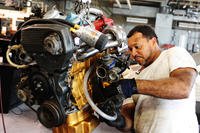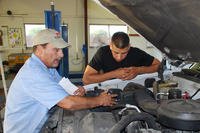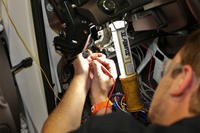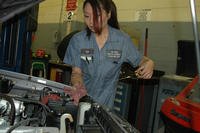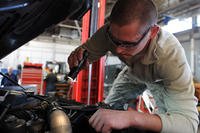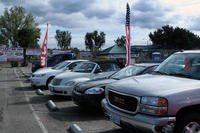Content provided courtesy of USAA.
Water can wreak havoc on a vehicle's electronics and raise the chances of mechanical failure. Know what signs to look for before buying a car.
When heavy rains douse a large area or a hurricane makes landfall, the chances, just like the water level, increase for water-damaged cars and trucks to show up in classified ads or in car lots across the country. When these vehicles are cleaned up, they look like they're in good condition. That's when they're even harder to spot. Proceed with caution when shopping for a vehicle; a previously flooded vehicle can have a higher likelihood of mechanical failure and a multitude of other problems.
These four tips can help prevent being fooled into buying a flood-damaged vehicle.
1. Ask the Seller
Whether you're purchasing a vehicle from an individual or a dealership, ask the seller if the vehicle has ever had significant flood damage. "While not all sellers will provide this information willingly," says James Ravizee, product management director of Consumer Lending at USAA, "gauging the seller's reaction may help you determine if there may have been flood damage to the vehicle."
2. Use Your Five Senses
After standing water drains, it can leave mildew in cracks and crevices. While sniffing for mildew might not be the first thing you think about when car shopping, some experts say this scent is a dead giveaway that the vehicle has been damaged by water.
Inspect the trunk, the dashboard and the undersides of seats for moisture, signs of rust, mold, sand or silt. Look at the engine parts, nuts and bolts for signs of rusting. Also, check the undercarriage for signs of corrosion or flaking metal.
3. Research the Vehicle's Past
Some flooded vehicles end up in the salvage yard and are then passed along to unaware consumers. Before you buy, use the National Insurance Crime Bureau's VINCheck SM, which allows you to find out whether a vehicle has been salvaged by searching for the vehicle identification number in a free online database.
But still proceed with caution. While insurance companies report flood-damaged vehicles to the NICB, not all cars are insured, leaving the possibility that some waterlogged vehicles won't make it into the salvage database.
A few extra bucks out of your pocket would be money well spent on a vehicle history report from AutoCheck® or CARFAX®. These reports can help a consumer determine if a vehicle was listed as flood damaged or originally titled in a coastal state.
4. Get a Second Opinion
If you live in a flood-prone area, or still have some suspicion about a car's flooded past, ask a reputable mechanic to conduct a thorough inspection before you decide to buy.
"If the seller is unwilling to allow you to get the vehicle inspected by a trusted mechanic," Ravizee warns, "this could be another indication that there may be hidden damage."
A cautious, consumer-conscious course of action can help you make sure your next car is water-damage free and ready to roll.
Ravizee concludes, "The decision of whether or not to purchase the vehicle is ultimately yours. Never let an individual or dealership pressure you into buying if you have doubts."
What If You've Already Unknowingly Bought a Water-damaged Vehicle?
A car that's been damaged in a flood may cause you problems and even be unsafe to drive.
- Understand the Federal Trade Commission's Used Car Rule, the federal "lemon law," also known as the Magnuson-Moss Warranty Act, as well as the lemon laws of the state where you bought the vehicle.
- Try to return the vehicle to the dealership. Speak to management if necessary.
- If you aren't able to return the vehicle, contact a lawyer for advice.
Finally, if you suspect a car dealer is committing fraud by knowingly selling a water-damaged car as a used car in good condition, contact your auto insurance company, your local law enforcement agency, the consumer fraud division of your state attorney general's office or the NICB at 800-835-6422.





